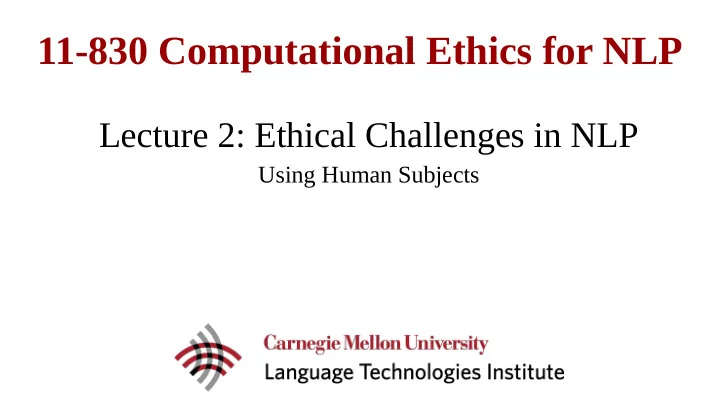

11-830 Computational Ethics for NLP Lecture 2: Ethical Challenges in NLP Using Human Subjects
Human Subjects We are trying to model a human function Labels are certainly noisy How to use humans to find better labels/know if they are right Let’s put it on Amazon Turk and get the answer 11-830 Computational Ethics for NLP
History of using Human Subjects WWII Nazi and Japanese prisoners in concentration camps Medical science did learn things But even at the time this was not considered acceptable Tuskegee Syphilis Experiments Stanford Prison Experiment Milgram experiment National Research Act of 1974 11-830 Computational Ethics for NLP
Tuskegee Syphilis Experiment Understand how untreated syphilis develops US Public Health System 1932-1972 Rural African-American sharecroppers, Macon Co, Alabama 399 already had syphilis 201 not infected Given free health care, meals and burial service Not provided with penicillin when it would have helped (Though not known at the start of the experiment) Peter Buxton, whistleblower, 1972 Doctor taking blood from Tuskegee Subject [National Archives via Wikipedia] 11-830 Computational Ethics for NLP
Stanford Prison Experiment Philip Zimbardo, Stanford University, August 1971 Test how perceived power affects subjects Groups arbitrarily split in two One group were defined “prisoners” One group were defined “guards” “Guards” selected uniforms, and defined discipline https://www.youtube.com/watch?v=oAX9b7agT9o 11-830 Computational Ethics for NLP
Blue vs Brown Eye “Racism” Kids separated by color of eyes Blue eyes are better Brown eyes are worse Quickly separate in clans Blue given advantages, Brown given disadvantages Kids quickly live our the divisions Is this experiment ethical? Do we learn something Do the participants learn something? _x0001_ https://www.youtube.com/watch?v=KHxFuO2Nk-0 11-830 Computational Ethics for NLP
Milgram Obedience Experiment Stanley Milgram, Yale, 1962 Three roles in each experiment Experimenter Teacher (actual subject) Learner Learner and Experimenter were in on the experiment Teacher asked to give mild electric shocks to the Learner Learner had to answer questions and got things wrong Experimenter, matter of factly, asked Teacher to torture Learner Most Teachers obeyed the Experimenter 11-830 Computational Ethics for NLP
Ethics in Human Subject Use These experiments (especially the Tuskegee Experiment) Led to the National Research Act 1974 Requiring “Informed Consent” from participants Requiring external review of experiments For all federal funded experiments 11-830 Computational Ethics for NLP
IRB (Ethical Review Board) Institutional Review Board Internal to institution Independent of researcher Reviews all human experimentation Assesses instructions Compensation Contribution of research Value to the participant Protection of privacy 11-830 Computational Ethics for NLP
IRB (Ethical Review Board) Different standards for different institutions Medical School vs Engineering School Board consists of (primarily) non-expert peers At educational institutions also Help education new researchers Make suggestions to find solutions to ethics problems How to get informed consent on an Android App “click here to accept terms and conditions” 11-830 Computational Ethics for NLP
Ethical Questions Can you lie to a human subject? Can you harm a human subject? Can you mislead a human subject? 11-830 Computational Ethics for NLP
Ethical Questions Can you lie to a human subject? Can you harm a human subject? Can you mislead a human subject? What about Wizard of Oz experiments? What about gold standard data? 11-830 Computational Ethics for NLP
Using Human Subjects But its not all these extremes Your human subjects are biased Your selection of them is biased Your tests are biased too 11-830 Computational Ethics for NLP
Human Subject Selection Example For speech synthesis evaluation Listen to these and say which you prefer Who do you get to listen Experts are biased, non-experts are biased Hardware makes a difference Expensive headphones give different result Experiment itself makes a difference Listening in quiet office vs on the bus Hearing ability makes a difference Young vs old 11-830 Computational Ethics for NLP
Human Subject Selection All subject pools will have bias So identify the biases (as best you can) Does the bias affect your result (maybe not) Can you recruit others to reduce bias Can you do this post experiment Most Psych experiments use undergrads Undergrads do experiments for course credit 11-830 Computational Ethics for NLP
Human Subject Selection Most IRB have special requirements for involving Minors, pregnant women, disabled 11-830 Computational Ethics for NLP
Human Subject Selection Most IRB have special requirements for involving Minors, pregnant women, disabled So most experiments exclude these Protected or hard to access groups are underrepresented 11-830 Computational Ethics for NLP
Human Subject Research US Government CITI Human Subject Research ● Short course for certificate All Federal Funded Projects require HSR certification ● You should do it NOW. Most IRB approval require CITI certification You should do it NOW 11-830 Computational Ethics for NLP
We’ll Use Amazon Mechanical Turk But what is the distribution of Turkers Random people who get paid a little to do random tasks Its a large pool so biases cancel out There are maybe 1000 regular highly rated workers Can you find out the distribution? Maybe, but the replies might not be truthful Does it matter? Depends, but you should admit it 11-830 Computational Ethics for NLP
Real vs Paid Participants Paying people to do use your system Not the same as them actually using it. Spoken Dialog Systems (Ai et al. 2007) Paid users have better completion rates ASR word error rate different paid vs real (Black et al. 2011) Paid, happy to go to wrong place (DARPA Communicator 2000) User: “A flight to San Jose please” System: “Okay, I have a flight to San Diego” User: “Okay” :-( 11-830 Computational Ethics for NLP
Human Subjects Unchecked human experimentation Led to IRB reviews of human experimentation All human experimentation includes bias Admit it, and try to ameliorate it Is your group the right group anyway Experimentation vs Actual is different 11-830 Computational Ethics for NLP
Recommend
More recommend